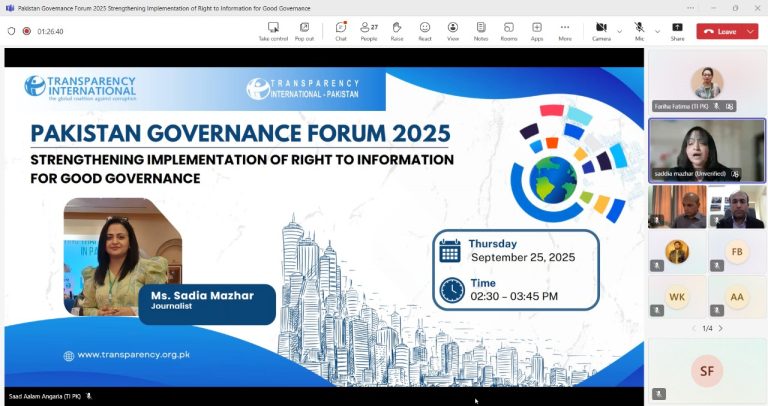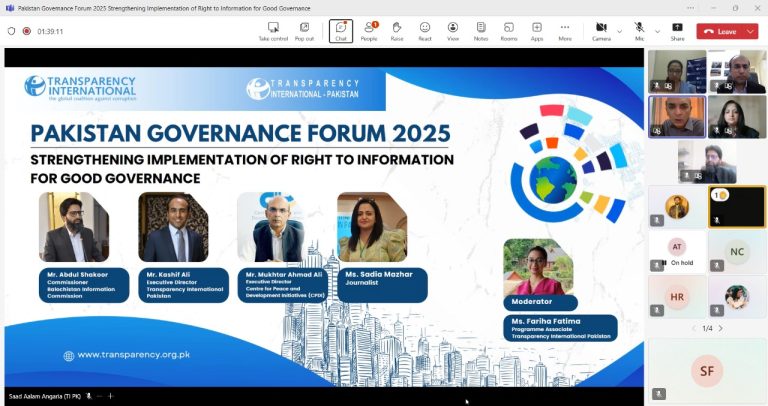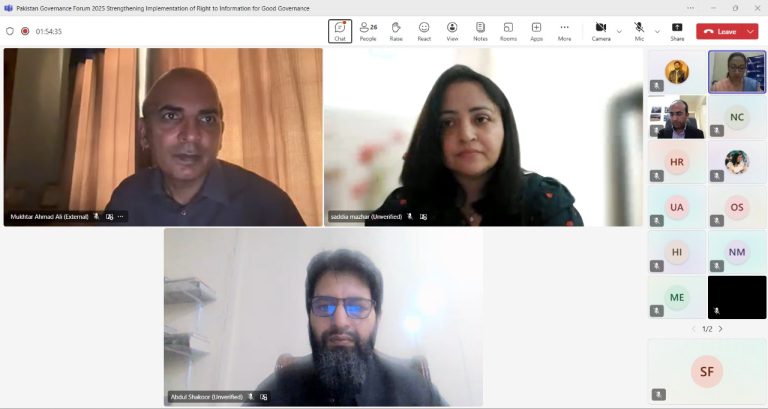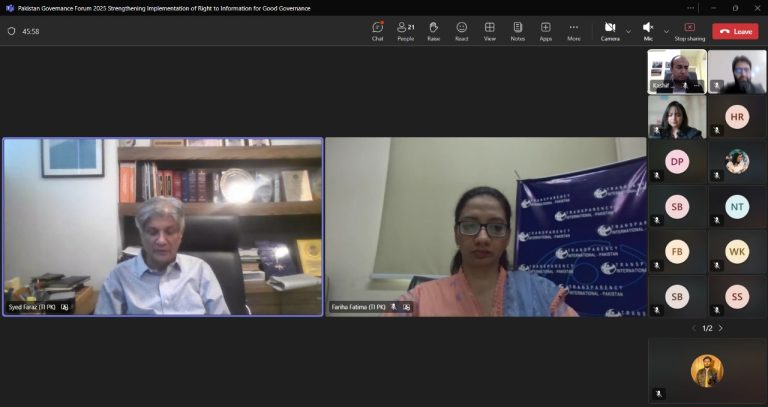Pakistan Governance Forum 2025: Strengthening Implementation of Right to Information for Good Governance
Pakistan Governance Forum 2025: Strengthening Implementation of Right to Information for Good Governance
Venue: Online
Date: Thursday, September 25, 2025
On the occasion of the International Day for Universal Access to Information (IDUAI), celebrated on September 28, Transparency International Pakistan hosted an online high-level forum Pakistan Governance Forum 2025: Strengthening Implementation of Right to Information for Good Governance. The forum aimed to reflect on Pakistan’s progress in implementing Right to Information (RTI) laws and to identify practical steps toward closing the gaps in access, enforcement, and public awareness.
The forum brought together a diverse group of stakeholders, including government policymakers and public information officers, civil society organizations, journalists and media professionals, legal and digital rights experts and students and educators.
The forum commenced with the Opening Remarks by Justice (R) M. Ather Saeed, Former Judge, Supreme Court & Board Member, TI Pakistan. He underscored that access to information is not merely a policy matter but a democratic imperative and a cornerstone of transparency, accountability, and good governance. Reflecting on Pakistan’s progress in legislating Right to Information (RTI) laws, Justice Saeed highlighted the persistent challenges in effective implementation, noting that many citizens remain unaware of their rights while public bodies often lack either the capacity or the will to comply.
Drawing on personal experiences, he shared insights from a 2011 RTI workshop, where he witnessed a robust system of timely responses and independent appeals that empowered citizens to hold authorities accountable. A striking example involved villagers using RTI to uncover misuse of public funds, leading to the construction of a long-delayed road. Justice Saeed highlighted his experience as Judge High Court Sindh mandating timely responses to RTI requests by Sindh Building Control Authority. However, he noted the fragility of such reforms when not institutionalized, as the initiative was not sustained after his departure. He also cited global best practices, such as Canada’s public cost disclosure on infrastructure that demonstrated public accountability.
Following the opening remarks, the panel discussion titled “Strengthening Implementation of Right to Information for Good Governance” was formally opened.
The first speaker was Mr. Abdul Shakoor, Chief Information Commissioner, Balochistan Information Commission. He began by highlighting the critical challenges faced in implementing the Right to Information (RTI) in Pakistan, particularly in Balochistan. Despite RTI being enshrined in law globally, and in Pakistan, there is a persistent lack of will among those in power to fully embrace transparency.
Mr. Shakoor informed that since the establishment of the Balochistan Information Commission about 8-9 months ago, it has faced significant obstacles, including bureaucratic resistance, lack of budget approval, and insufficient office resources. Even basic necessities such as office space and staff salaries were denied, and much of the opposition came from within government departments themselves.
He applauded TI Pakistan’s efforts in supporting and facilitating the operationalization of the Information Commission in Balochistan. Mr. Shakoor lamented the poor response from government departments, citing an example where only four out of 60-70 departments responded to requests for appointing Public Information Officers (PIOs). The proactive disclosure requests also largely went unanswered. Nonetheless, he expressed optimism and determination, stating that while the road is difficult, the commission remains committed to taking the necessary first steps and facing these challenges head-on.
Next speaker was Mr. Mukhtar Ahmad Ali, Executive Director, CPDI Islamabad. Mr. Mukhtar was also a part of the Punjab Information Commission and he told that during the early days of the Commission, there was no official office, and the commissioners had to carry out their duties from home. He highlighted the delays in the appointment of commissioners and raised concerns about the lack of merit-based criteria in the selection of public information officers. He emphasized that the ultimate solution lies in public awareness. When citizens are well-informed about their rights, they are better equipped to safeguard those rights, identify gaps in implementation, and demand accountability.
He stressed that people must not remain passive; they should become active citizens, consistently engaged, raising their voices, and holding institutions accountable to ensure transparency and good governance. He urged educational institutions, civil society, and the media to play a proactive role in spreading awareness about the Right to Information.
Following this, Ms. Sadia Mazhar, Senior Journalist spoke to the forum. She emphasized that in an era where misinformation and fake news are rapidly spreading, Right to Information (RTI) laws serve as one of the most effective tools to counter false narratives and ensure the dissemination of verified, factual information.
Sharing a personal example, she pointed out that the Punjab Assembly’s website was once outdated when she tried to find information about the member provincial assembly representing her constituency, and she had to file a Right to Information (RTI) request to obtain the details. The website is now fully functional and regularly updated with comprehensive details of all MPAs in Punjab.
Ms. Mazhar said that journalists should make frequent use of RTI laws and stay connected with organizations like TI Pakistan, which actively work on promoting the Right to Information (RTI). Social media can play a vital role in spreading awareness about RTI, helping people understand that even everyday issues, such as road maintenance and sewerage problems, can be addressed through this powerful tool.










